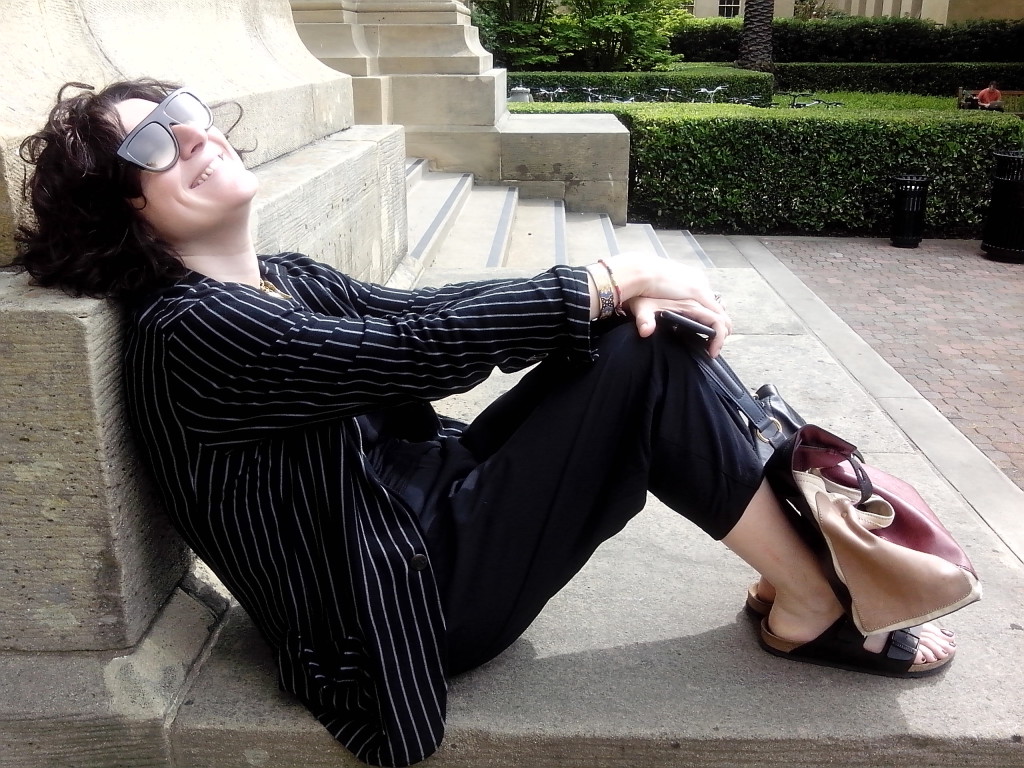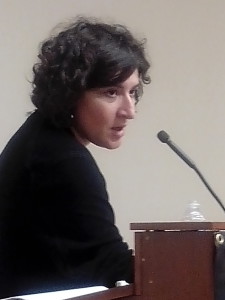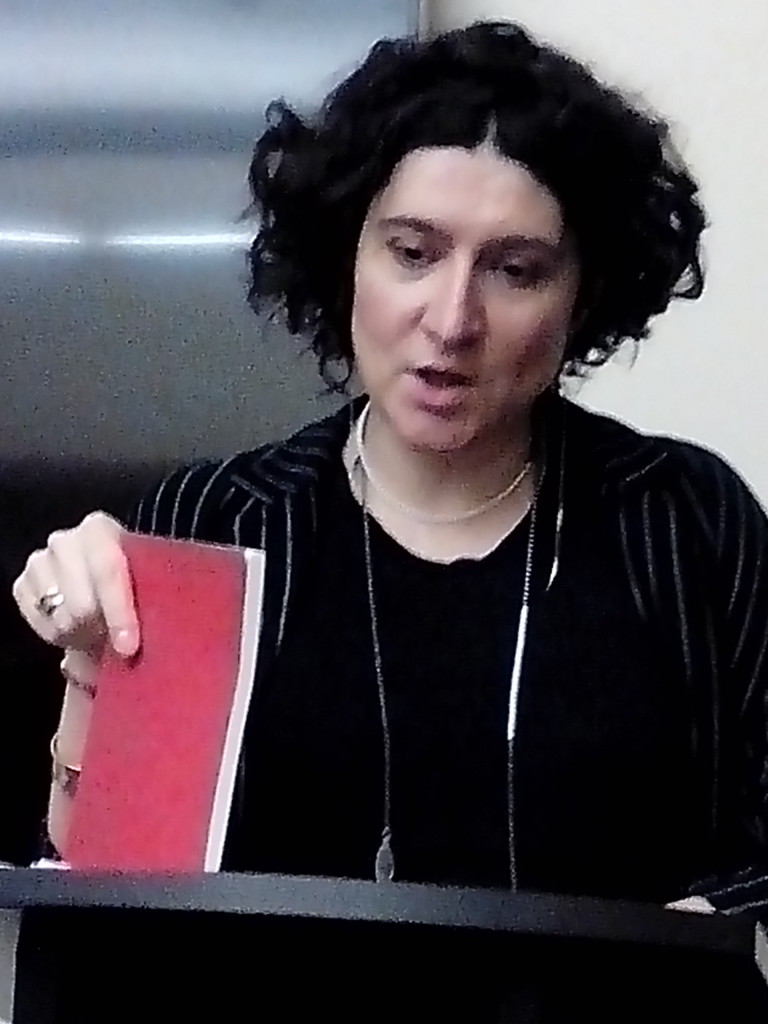
La Dolce Vita at Stanford? Maria on the front steps of Stanford’s Green Library. (Photo: Cynthia Haven)
She came, she saw, she conquered. Maria Stepanova‘s visit to Stanford was short, but intense – and I took plenty of photos, so I’ll give her the star treatment. Her Stanford debut took place at the Stanford Humanities Center on Wednesday, April 6, where she spoke on “Time Backward: Putin’s Russia in Search of Identity.” Although it wasn’t exactly a full house, it came very close. The event was filmed, and I’ll post the link when it’s available. (And we’re pleased that Robert Pogue Harrison recorded an Entitled Opinions radio interview with her – we’ll post that, too.) Meanwhile, I introduced the event with these words:

Speaking on Putin’s Russia. (Photo: C. Haven)
“…I’m pleased tonight to introduce our guest from Moscow, the poet, publisher, journalist, essayist, and, I’m proud to say, my friend – Maria Stepanova.
“She was born in Moscow in 1972 and graduated from the Gorky Literary Institute in 1995. She was twice awarded the Znamya Prize, the first time in 1993, the prestigious Andrei Bely Prize and Pasternak Prize, both in 2005, and the Hubert Burda Fund Prize the following year.
“In fact, she was already an important and innovative poet by the time Vladimir Putin came to power, but the times called for her to take a tougher and more public stance. Today, she is one of the most visible figures in post-Soviet culture – not only as a poet, journalist, and publisher, but also as a powerful voice for press freedom.
“She is the founder of Colta, the only independent crowd-funded source of news that exists in Russia today, with 900,000 unique visitors per month. The online magazine has been called a Russian Huffington Post in format and style – and also compared to the New York Review of Books for the scope and depth of its essays.
“I’d like to take a minute to explain the Colta story, because it’s a good story in a country that doesn’t offer many of them at this historical moment. Colta began with the online ‘Openspace,’ which Maria founded in 2007.

At her reading. (Photo: C. Haven)
What she envisioned was a cultural daily, something that would provide Russians with up-to-date and passionate p.o.v. But she soon learned that culture couldn’t stand apart from the political and social changes that were occurring. Private funders pressured Maria to cover more entertainment, less politics. She resisted.
“The differences came to a head in 2012, when nervous funders pulled their support altogether in a political climate that was growing increasingly hostile to independent journalism. She and her colleagues received compensation when the website was terminated – and together, they used their used their severance packages to launch a new website Colta, with volunteer help.
“Colta was born only a few months after the demise of Openspace – and it was funded by ordinary Russians.”Colta had a vital role to play: as the official media, whether print or broadcast or internet, became more propagandistic and xenophobic, Colta offered an alternative. It became the place where you still could find unfiltered information what is going on in the wider world – without even a paywall to close out young, impoverished, or far-flung readers.

At the Stanford Humanities Center (Photo: C. Haven)
“Colta has been a success for four years. But let us not forget that some consider Maria to be Russia’s greatest living poet. She is the author of ten poetry collections and a continues to get international prizes and recognition in recent years, includnig a Joseph Brodsky Fellowship, and last year a fellowship with Vienna’s distinguished Institute for Human Sciences. I encourage you to attend her reading of her poems, in Russian, tomorrow night’s reading, at 6 p.m. in the German Library, Room 252, of Piggott Hall.
“Maria’s talk tonight will consider Russia’s current obsession with a patchwork of different visions of the past, where one can take shelter from an uncertain future. Yet, as she points out, the future is inevitable, whether we welcome it or not.
“Let’s welcome Maria Stepanova.”
The questions continued well after the 9 p.m. ending time, and I finally suggested that we congregate in the lobby for informal discussion. The surprise was the euphoria afterwards, with people thanking Maria, me, and anyone else who was connected with making this event possible.
Maria was given a bottle of Chardonnay as a thank you, and I’m happy to say it was rapidly consumed that night in the verdant gardens of Stanford Terrace Inn – by Maria, the poet Helga Olshvang, and me, as we munched the snap peas that were left over from the crudités at the Stanford Humanities Center. It was a magical evening, from the Japanese dinner that began it to the quiet conversation that ended it under the stars.
Postscript on 4/11: We got some nice pick-up from AdWeek‘s “Fishbowl” column – here.

Au revoir, Maria! (Photo: C. Haven)

